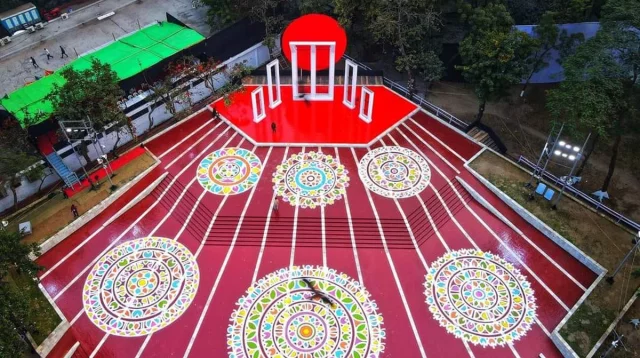Introduction:
21 February is the International Mother Language Day and in Bangladesh, the day is observed as National Martyr’s day since 1952. The day is marked with the martyrdom of valiant sons of Bangladesh for establishing Bangla as the state language of the then East Pakistan (present Bangladesh). This is one and only sacrifice of lives for the sake of the Mother Language in the history of mankind. On this significance of the day, UNESCO declared 21st February as the International Mother Language Day to promote linguistic and cultural diversity and multilingualism.
To observe the day, the people of the world in a barefoot walk to the Martyrs’ Memorials to pay homage to the martyrs with flowers wearing traditional dress and singing songs.
Background:
The Bengal province was split up based on the majority religions of the people when India was partitioned in 1947. The eastern portion became a province of Pakistan known as East Bengal and then East Pakistan, while the western portion became a part of India. But there were conflicts between East and West Pakistan in terms of language, culture, and economy.
When Pakistan’s West Pakistani-dominated administration proclaimed that Urdu should be the only national language in 1948, these tensions became evident. The majority Bengali-speaking populace in all of Pakistan was incensed by this and began to demonstrate. Although the government forbade protests, University of Dhaka students and other activists managed a demonstration on February 21, 1952. Four students were killed when the police opened fire on the protesters later that day. As Bengali speakers fought for the freedom to speak their native tongue, the disturbance persisted. Many more individuals lost their lives in protest, showing their support for the demand that Bengali be made one of Pakistan’s official national languages.
Abdus Salam, Abul Barkat, Rafiq Uddin Ahmed, Abdul Jabbar and Shafiur Rahman died, with hundreds of others injured. This was a rare incident in history, where people sacrificed their lives for their mother tongue.
Since then, Bangladeshis celebrate the International Mother Language Day as one of their tragic days. They visit the Shaheed Minar, a monument built in memory of the martyrs and its replicas to express their deep sorrow, respect and gratitude to them.
Finally, Bengali became one of the national languages in Pakistan on February 29, 1956. Following the Bangladesh Liberation War in 1971, Bangladesh became an independent country with Bengali as its official language. The students’ deaths in fighting for the right to use their mother language are now remembered on International Mother Language Day. The Bengali language movement represented the quest for equality, human rights, struggle against the Pakistani oppressive regime, and for emancipation.
Unesco Recognition:
On November 17, 1999, UNESCO proclaimed February 21 to be the International Mother Language Day (IMLD) and it was first observed globally on February 21, 2000. The resolution to proclaim IMLD by UNESCO was first suggested by Mr. Rafiqul Islam, a Bangali Canadian living in Vancouver, Canada. He wrote a letter to the UN Secretary-General Kofi Annan on 9 January 1998 asking him to take a step to saving the world’s languages from extinction by declaring an International Mother Language Day. Mr. Islam proposed the date as 21 February to commemorate the 1952 killings in Dhaka. Also, the UN General Assembly proclaimed 2008 as the International Year of Languages to promote unity in diversity and international understanding through multilingualism and multiculturalism, and on May 16, 2009, it called on its Member States to promote the preservation and protection of all languages used by people of the world.
Conclusion:
Known as Martyr’s Day or Shohid Dibosh (in Bengali), the International Memorial Day (IMLD) is observed as a public holiday in Bangladesh. This day is significant in the history of the nation. At the Martyr’s Monument, flowers are laid on this day by the public. It’s a moment to honor Bangladesh’s culture and the Bengali language, as well as to show solidarity and support for all other countries fighting to maintain their native tongues and customs.

